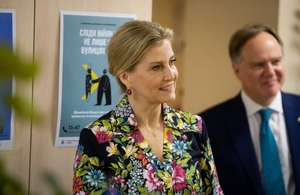The Duchess of Edinburgh becomes first Royal to visit Ukraine since the start of the Russian invasion
The Duchess of Edinburgh visited Ukraine to show her solidarity with men, women and children affected by the Russian invasion.

HRH The Duchess of Edinburgh in Kyiv, pictured with British Ambassador to Ukraine Martin Harris.
- Her Royal Highness met with survivors of sexual violence, and female internally displaced persons (IDPs )and volunteers who help their communities cope with the trauma of the invasion
- two years on from Bucha’s liberation, The Duchess of Edinburgh also paid her respects to those who lost their lives during Russia’s occupation.
Today, [Monday 29th April] The Duchess of Edinburgh becomes the first member of the Royal family to visit Ukraine since Russia’s full-scale invasion, to show her solidarity with survivors of conflict-related sexual violence and torture, and as part of her work as a champion of the UK’s Preventing Sexual Violence in Conflict Initiative and the Women, Peace and Security agenda.
While in Ukraine, The Duchess of Edinburgh met with survivors of conflict-related sexual violence and survivors of torture who bravely shared their stories, and with children who have now been safely returned to Ukraine, after being forcibly separated from their families and deported by Russia as part of a sustained campaign to erase Ukrainian culture.
Her Royal Highness also met with President Zelenskyy and First Lady Zelenska to discuss how best to support survivors of conflict-related sexual violence and the women peacebuilders who have a vital part to play in ensuring Ukraine’s recovery and reconstruction is effective and long-lasting.
Addressing the Conflict-Related Sexual Violence (CRSV) Conference last month, Her Royal Highness the Duchess of Edinburgh said:
Survivors here and around the world have spoken out so bravely about their experiences.
They are the most powerful advocates who remind us all that we must not turn our backs on the horrors of this crime, we must never forget survivors.
Rather, we must stand shoulder to shoulder with all survivors to secure justice and holistic redress, and ensure that this crime isn’t an accepted part of conflict.
Their rights and their voices must be at the heart of all our efforts to consign conflict-related sexual violence to the history books.
During the visit, The Duchess of Edinburgh paid her respects to those who lost their lives in Bucha, 2 years on from its liberation from Russian forces, and visited the ‘Road to Life’, a bridge which became a key part of the Ukrainian resistance when it was blown up to stop Russian troops proceeding to Kyiv, and later became a vital route for people to flee to safety from the Russian occupation.
Her Royal Highness also demonstrated her support for Ukrainian women who have played important roles in the conflict and community recovery, in a meeting with female volunteers who help their communities cope with the aftermath of the attacks with mental health care activities for children.
Since 2022, the UK has pledged over £4.7 billion in non-military support to Ukraine. This includes over £660 million of bilateral assistance that prioritises the needs of women and girls, for example by funding vital services for survivors of Gender Based Violence, as well as working with the Office of the Prosecutor General to put survivors at the centre of approaches to prosecuting conflict-related sexual violence crimes.
The UK is working with international partners to hold those responsible for atrocities to account. In addition to providing financial and technical assistance to the International Criminal Court, we have deployed specialist UK war crimes and conflict-related sexual violence experts to the region, and created an expert Atrocity Crimes Advisory Group with the EU and US.
Media enquiries
Email [email protected]
Telephone 020 7008 3100
Contact the FCDO Communication Team via email (monitored 24 hours a day) in the first instance, and we will respond as soon as possible.